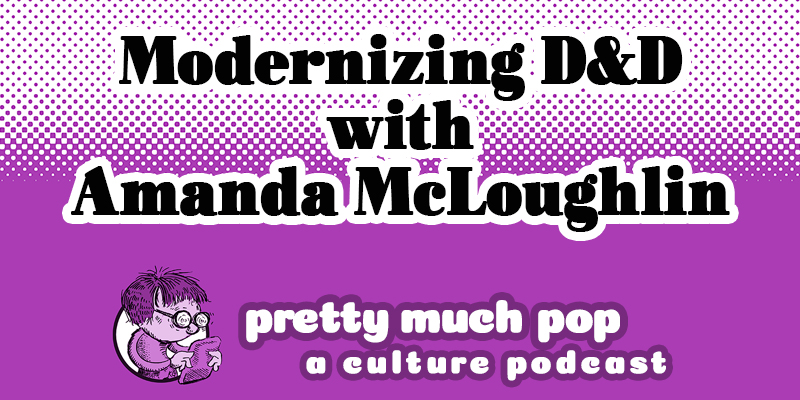
What’s the current status of table-top role-playing games like Dungeons and Dragons in pop culture? Thanks to D&D’s recent depiction in Stranger Things and the enormous popularity of fantasy properties like Game of Thrones and Lord of the Rings, interest in elves and magic and such is no longer fodder for Satanic panic, but the idea of actively pretending to be a character in this genre to engage in collaborative story-telling still seems foreign to many.
Your Pretty Much Pop hosts Mark Linsenmayer, Erica Spyres, and Brian Hirt are joined by Amanda McLoughlin, the host of Join the Party, a beginner-friendly, purposefully inclusive D&D real-play podcast, to go over some D&D basics, the dynamics of playing vs. spectating (by listening to her podcast, for instance), and the racism and imperialism built into the setting (adventure = going into a foreign land to kill often intelligent creatures and take their stuff). What is it to “act out your fantasy” in this way?
Some of the ways of witnessing others playing that we refer to include Critical Role, The Adventure Zone, and Dimension 20.
The Join the Party game master Eric Silver wrote the article “Dungeons & Dragons Has an Antisemitism Problem.” You can also look at Wikipedia’s “Dungeons and Dragons in Popular Culture” entry or get a flavor of the range of options by looking at Dicebreaker’s list of “10 Best Tabletop Roleplaying Games Out Right Now“, this list of “The 12 Best Actual Play Podcasts,” or this video of “Top D&D Channels that Aren’t Critical Role.”
Follow Amanda’s podcast @jointhepartypod on @MultitudeShows. She also hosts the Spirits Podcast about folklore and urban legends.
Hear more of this podcast at prettymuchpop.com. This episode includes bonus discussion that you can access by supporting the podcast at patreon.com/prettymuchpop. This podcast is part of the Partially Examined Life podcast network.
Pretty Much Pop: A Culture Podcast is the first podcast curated by Open Culture. Browse all Pretty Much Pop posts.
Modernizing Table-Top Role-Playing Games — Pretty Much Pop: A Culture Podcast #96 is a post from: Open Culture. Follow us on Facebook and Twitter, or get our Daily Email. And don't miss our big collections of Free Online Courses, Free Online Movies, Free eBooks, Free Audio Books, Free Foreign Language Lessons, and MOOCs.
from Open Culture https://ift.tt/3xAqsEt
via Ilumina
Comments
Post a Comment